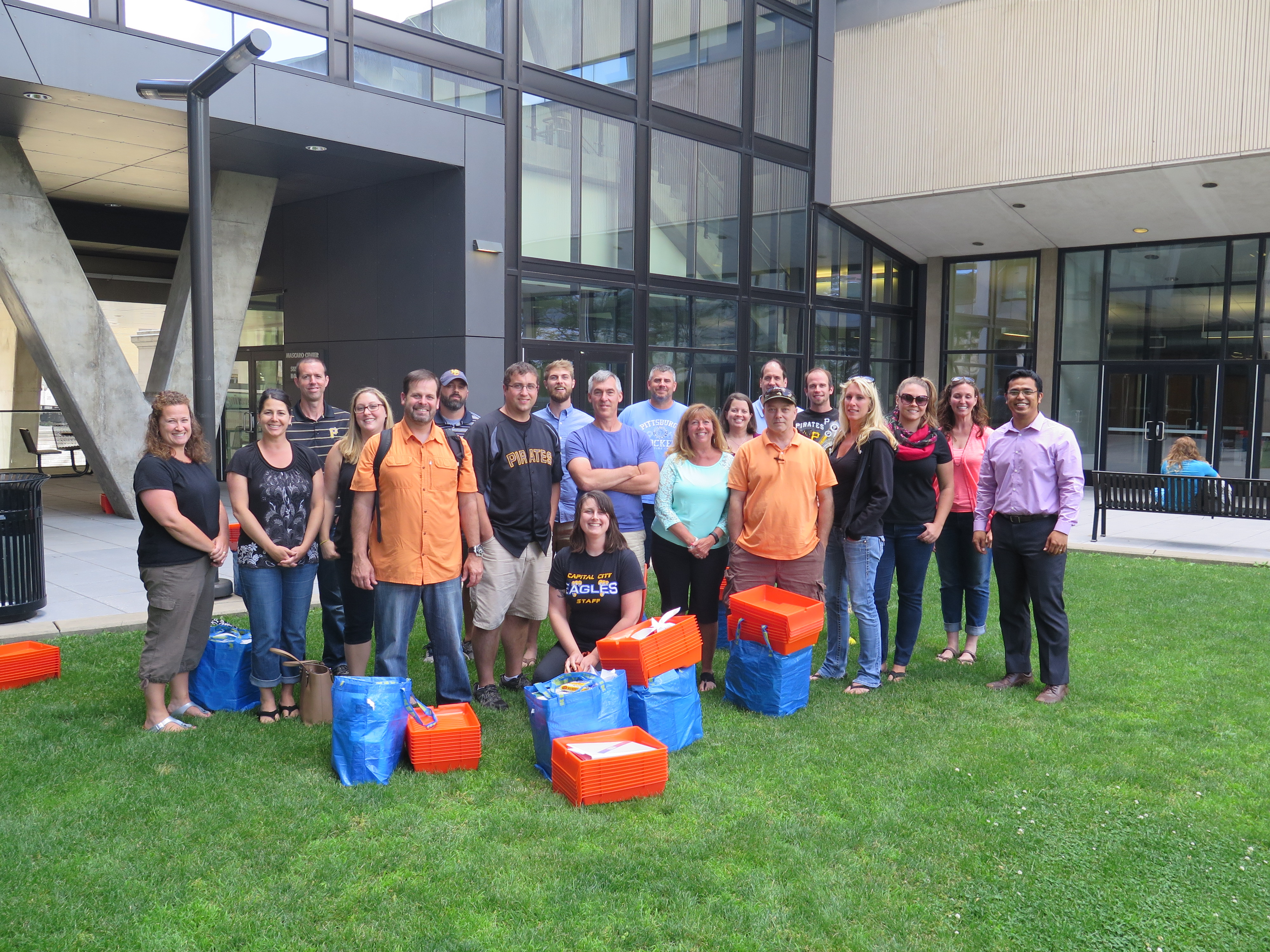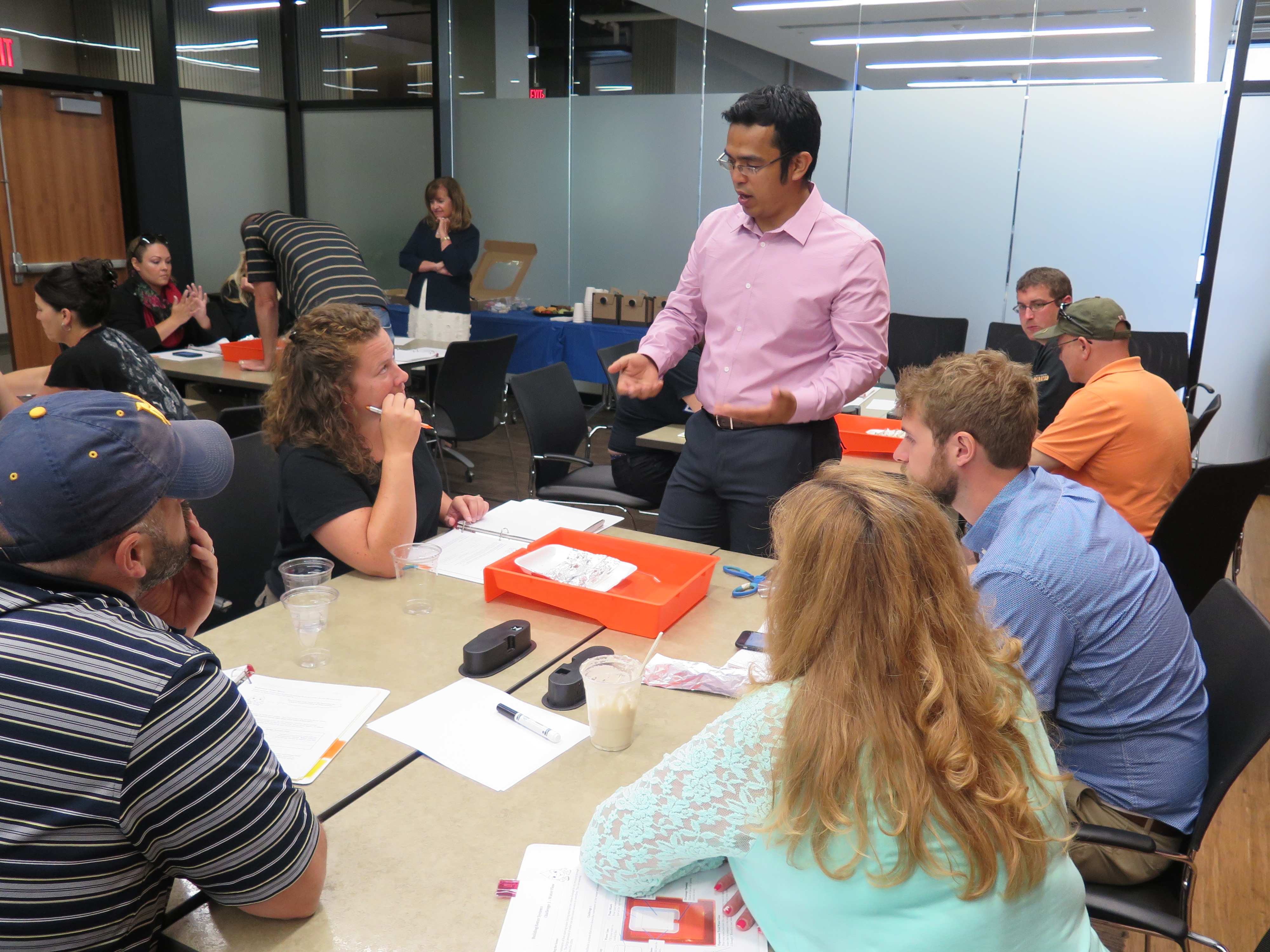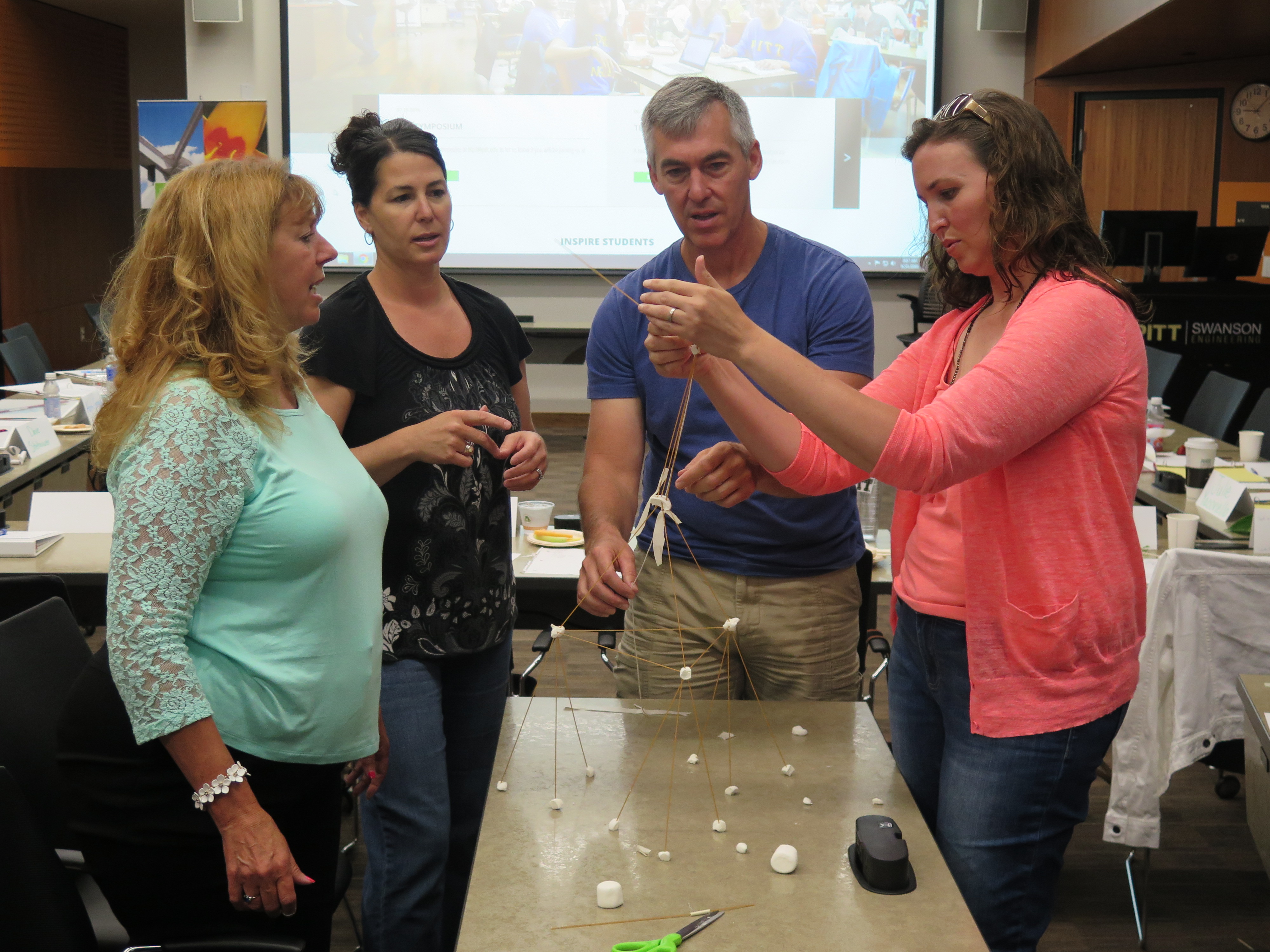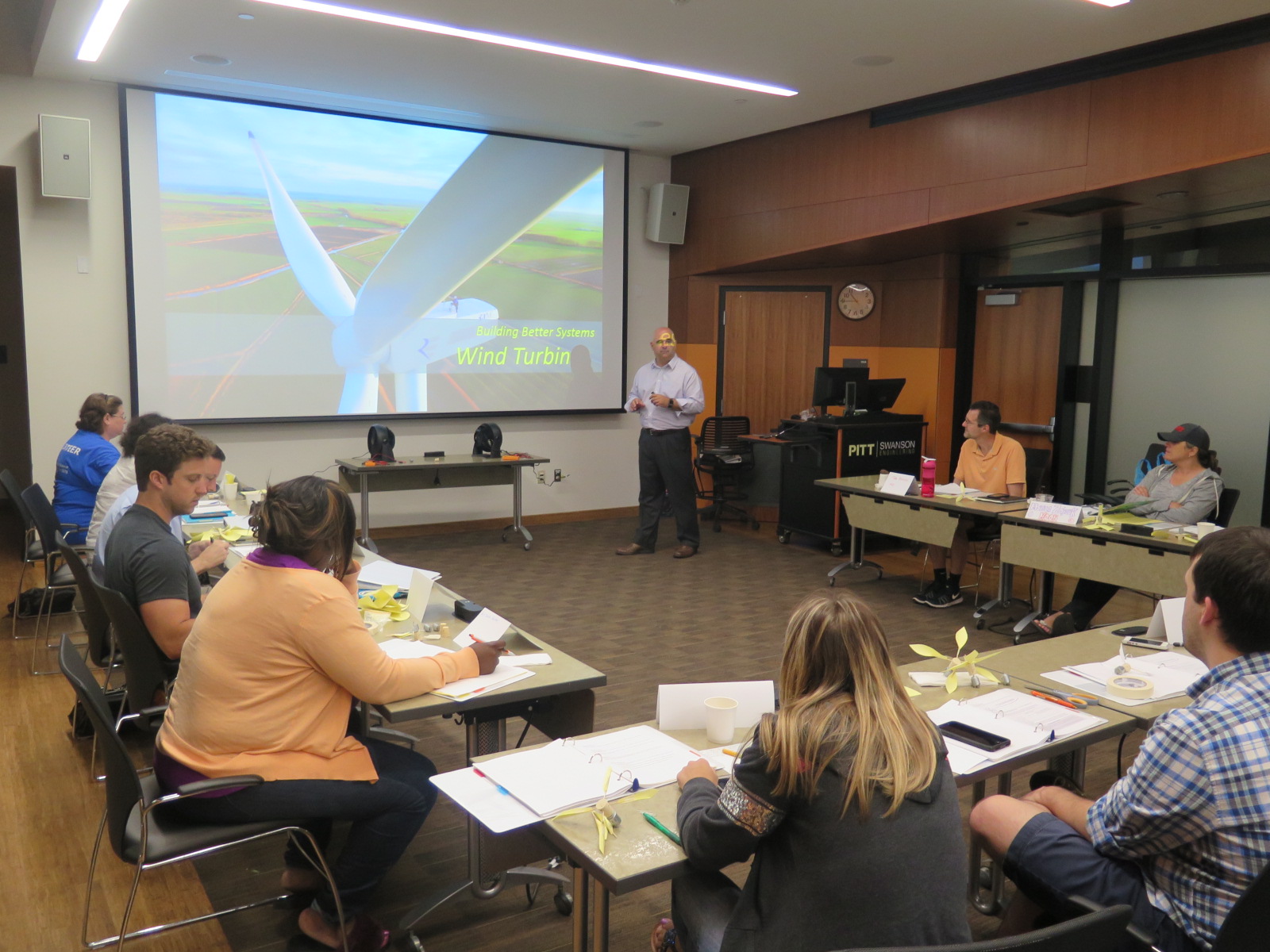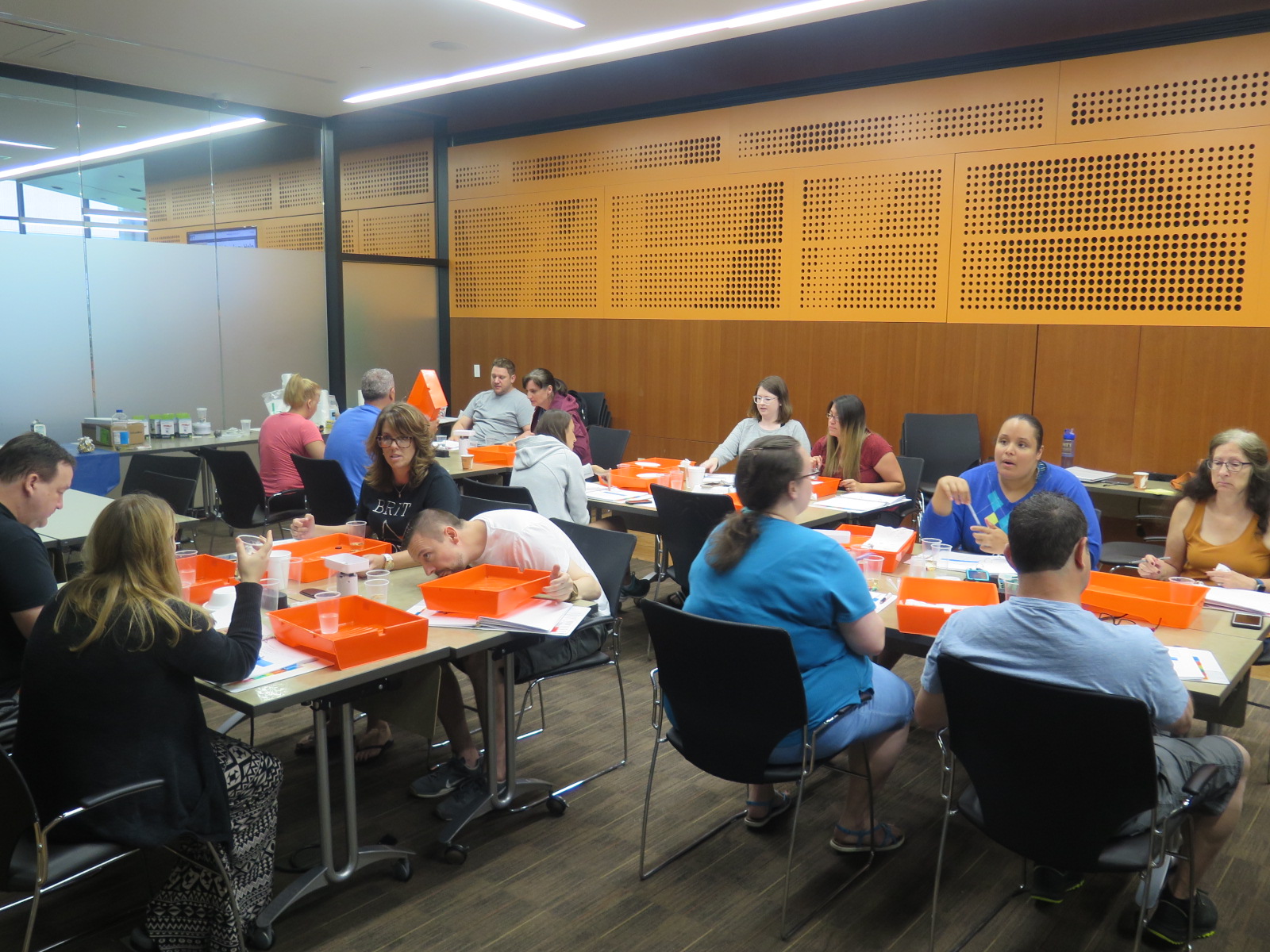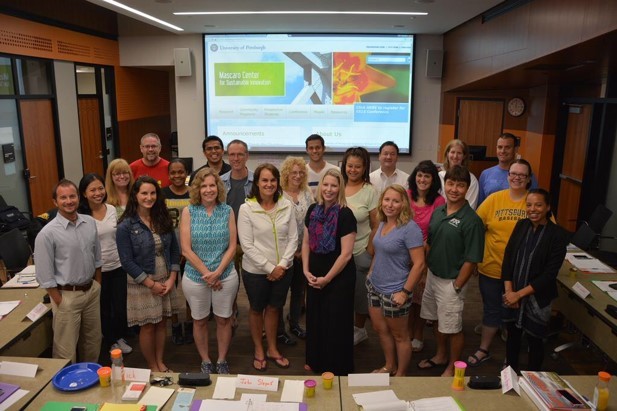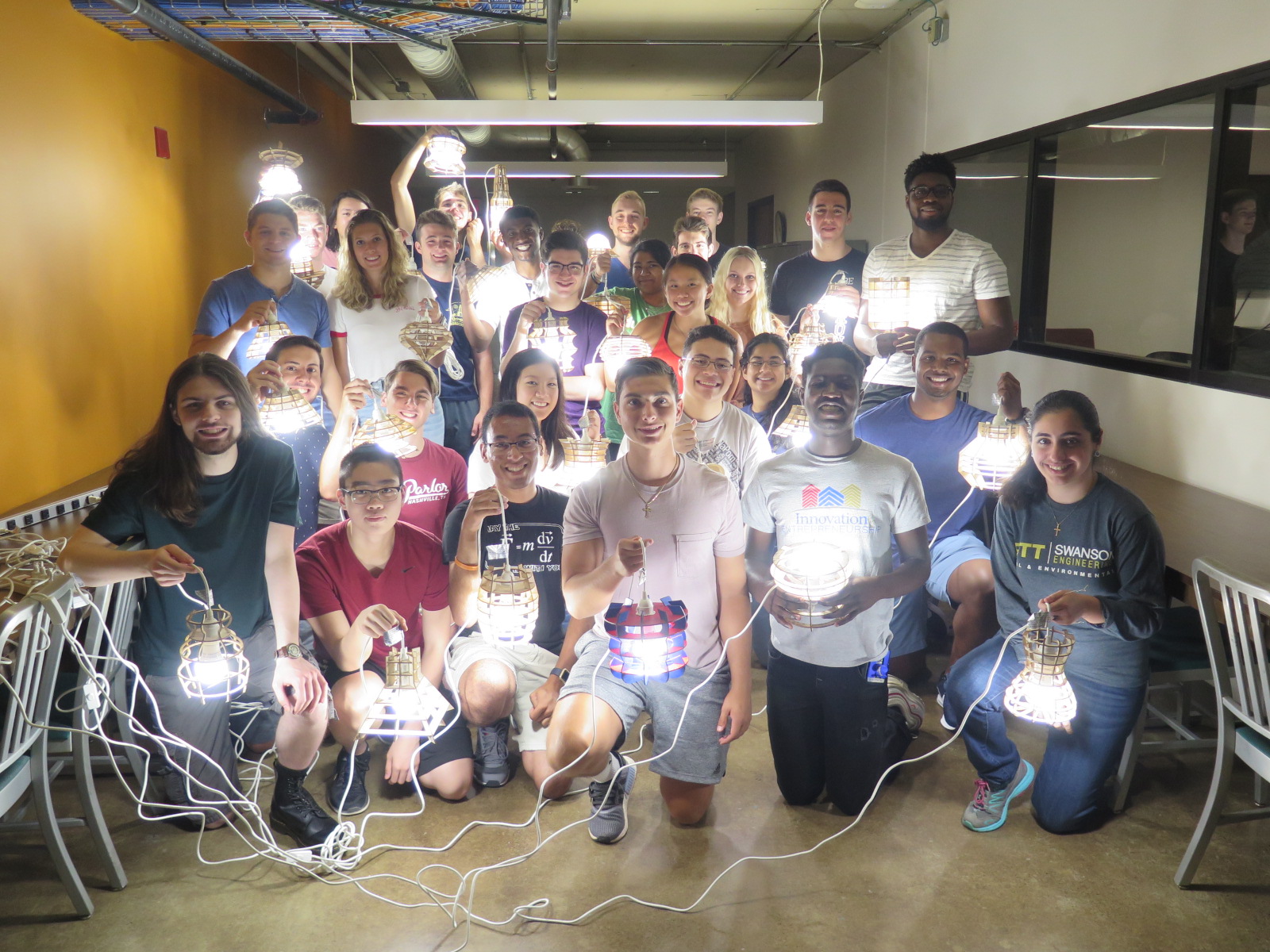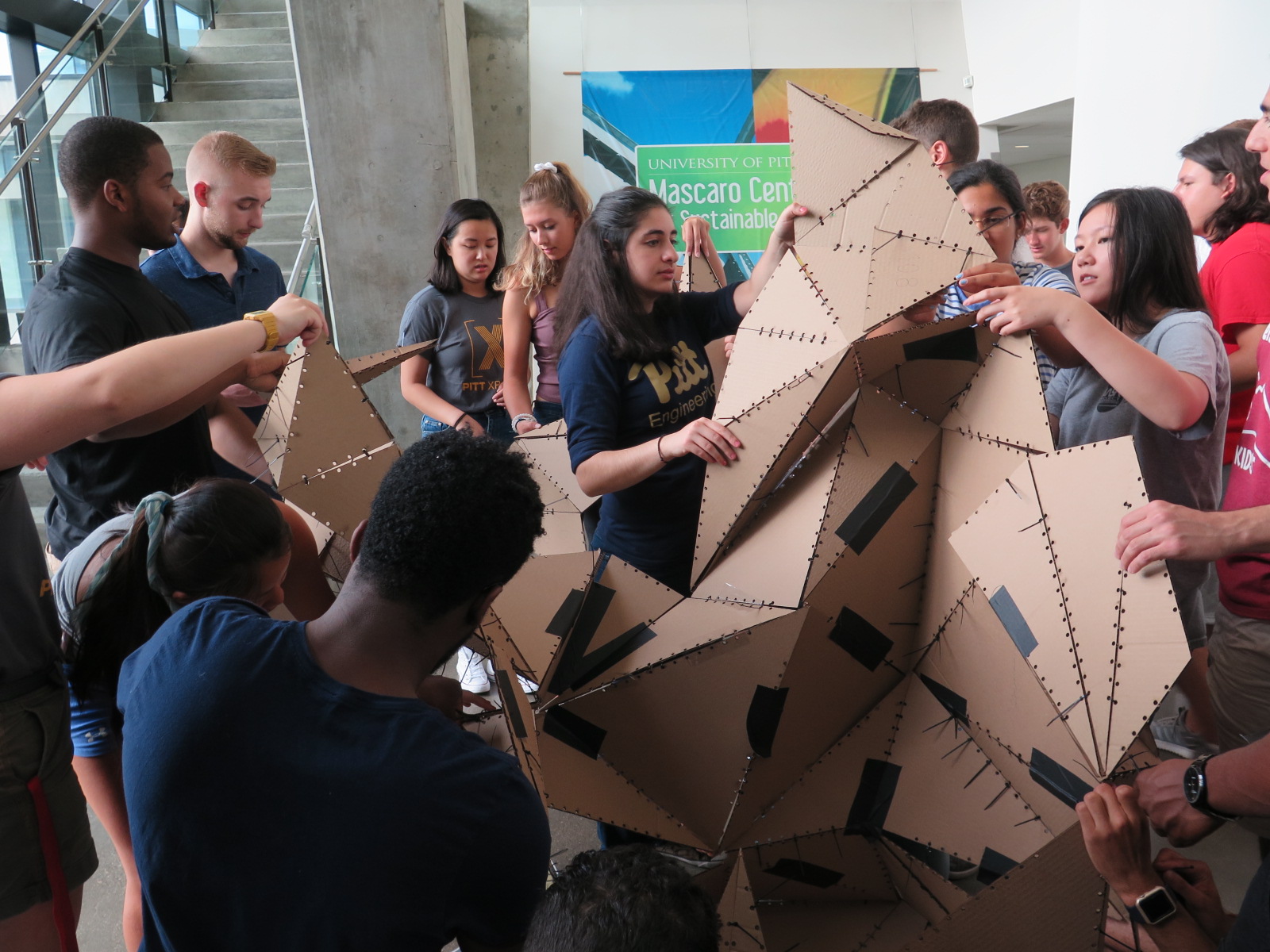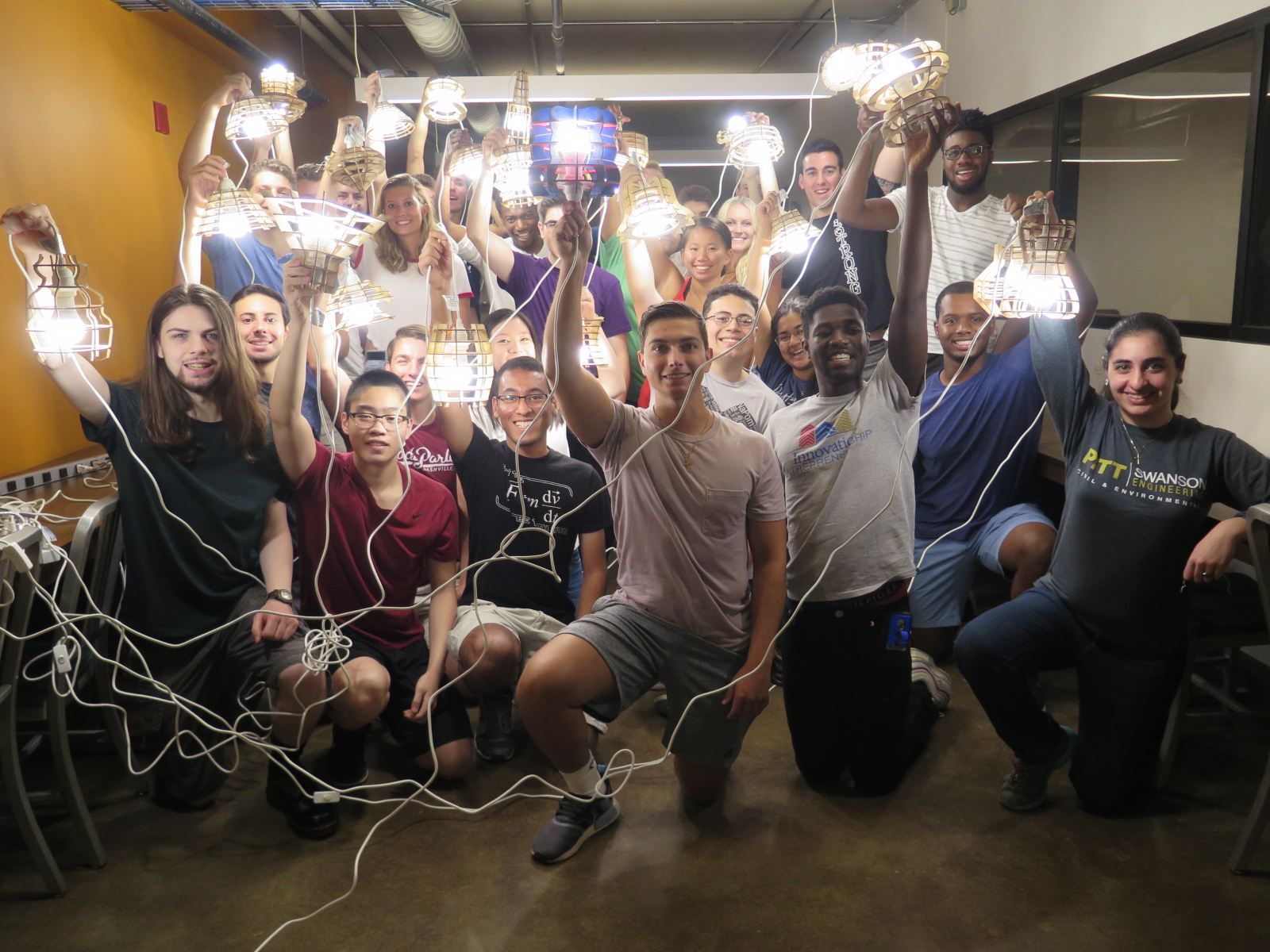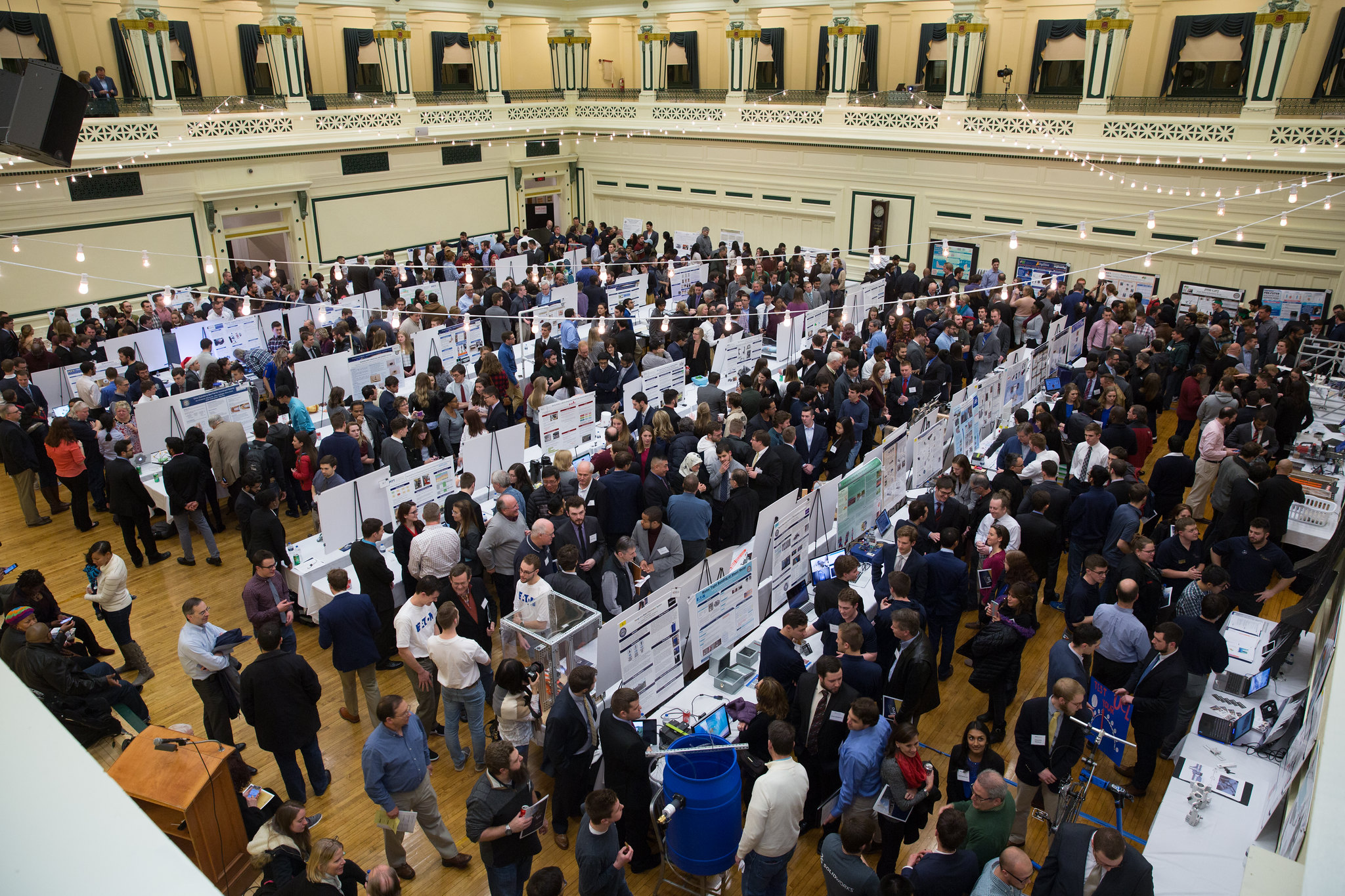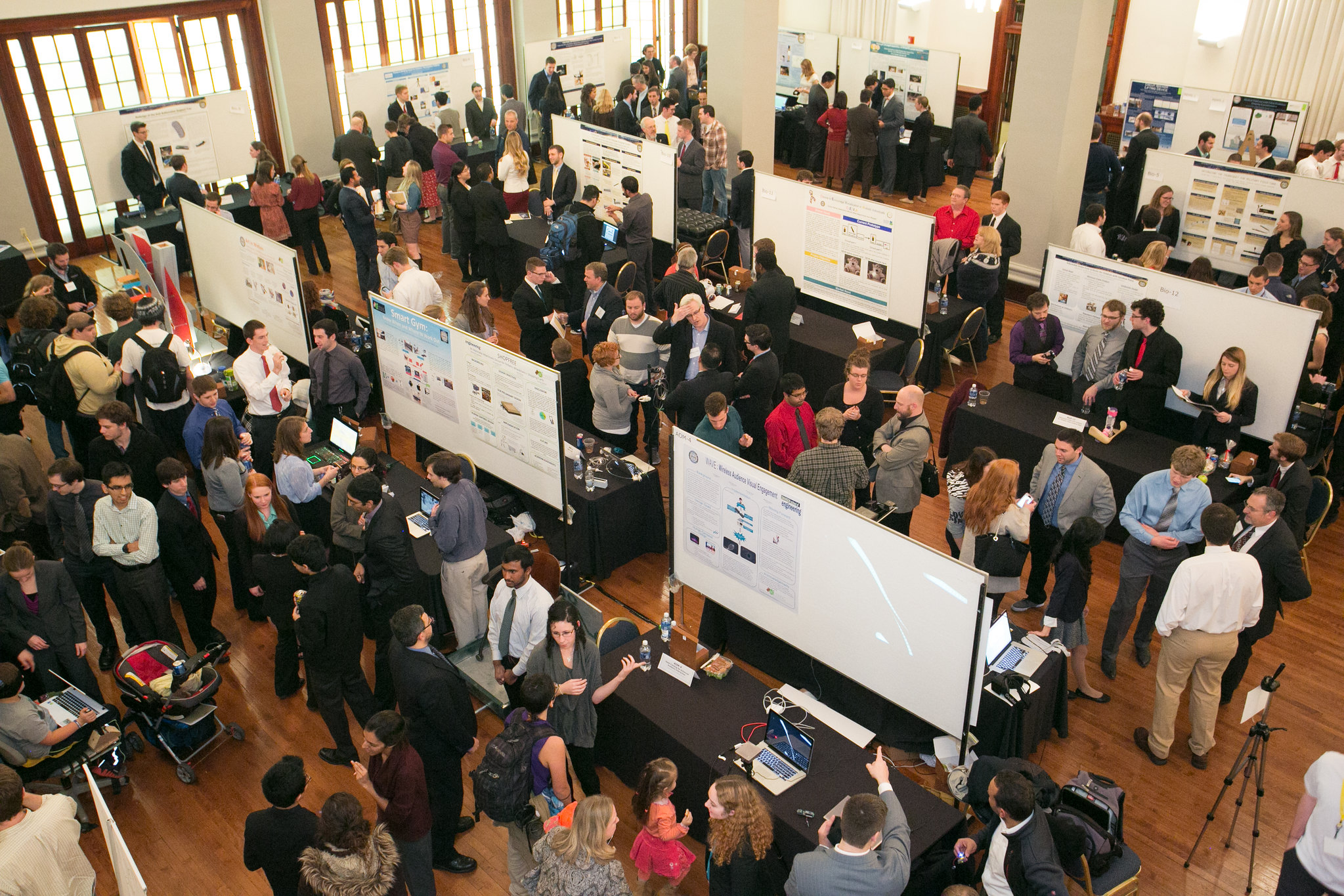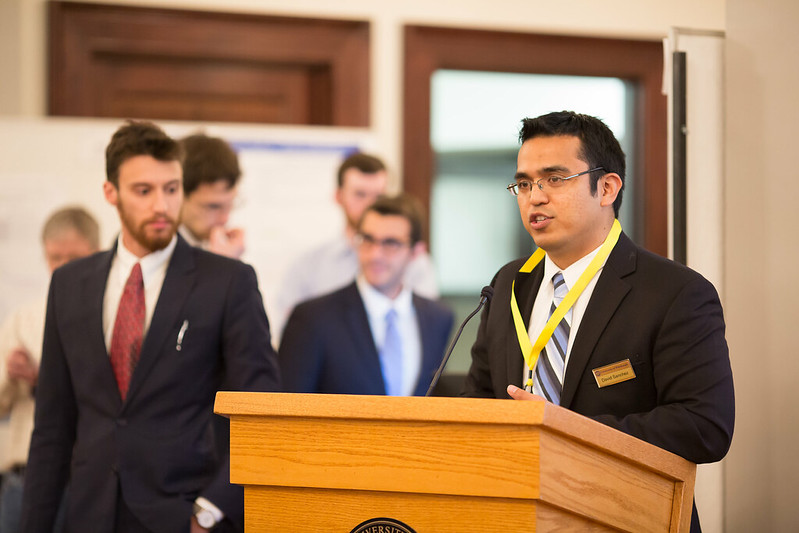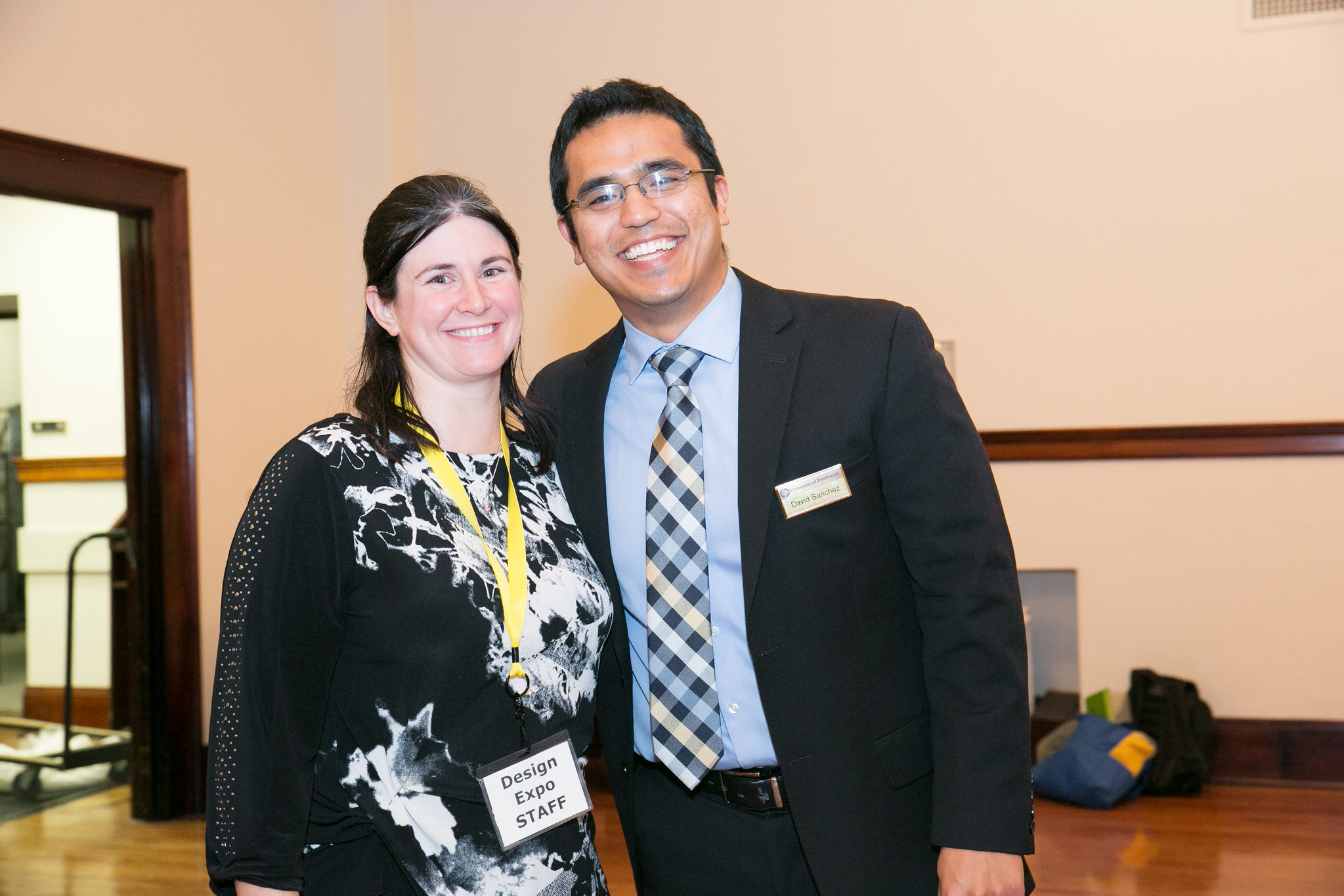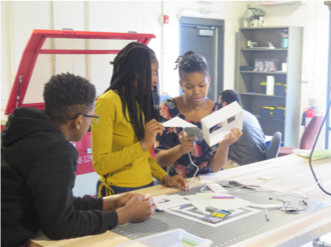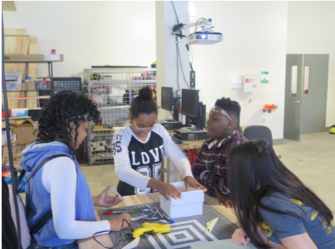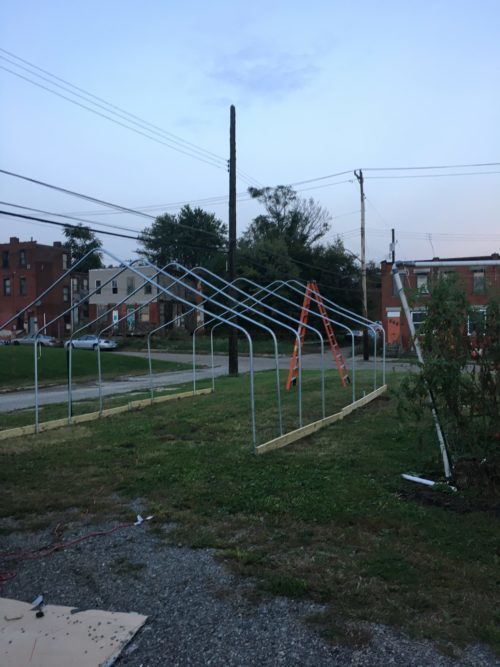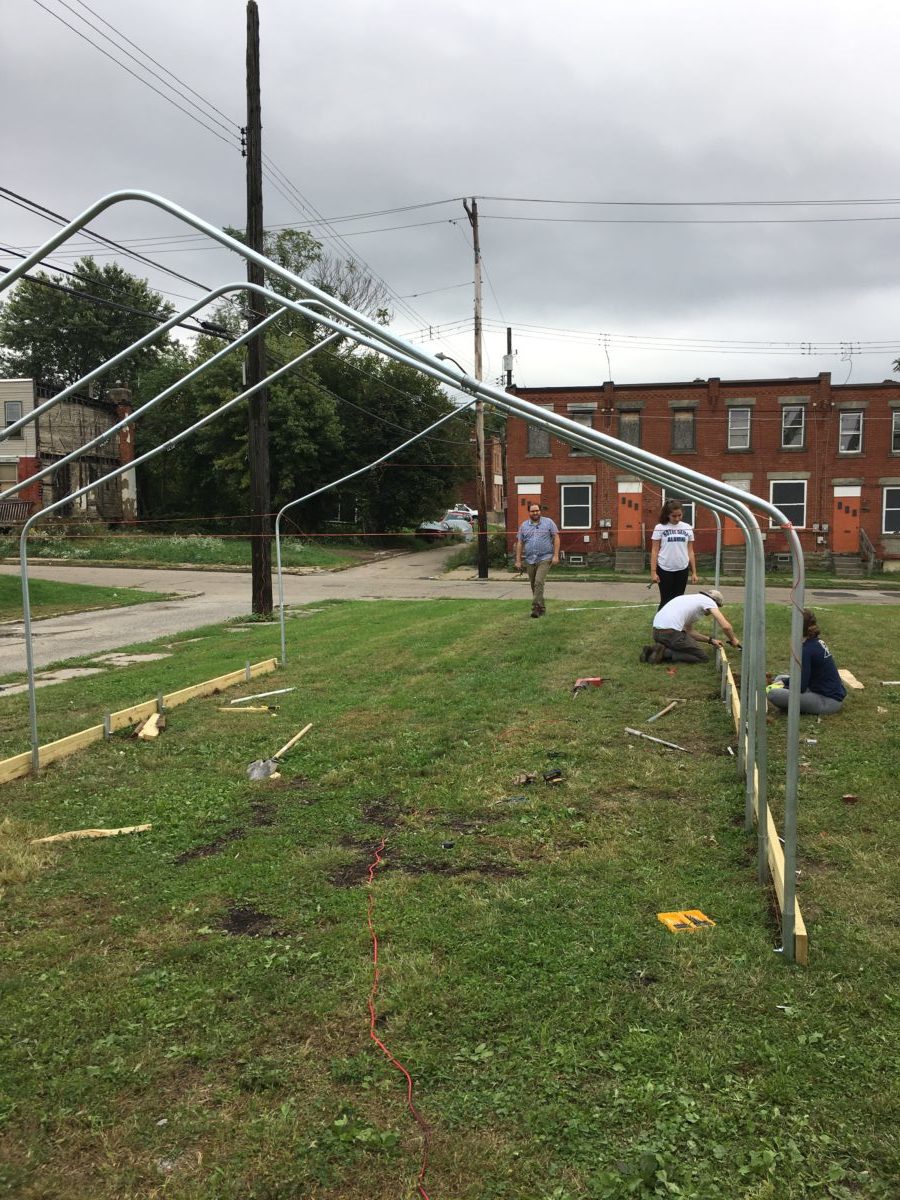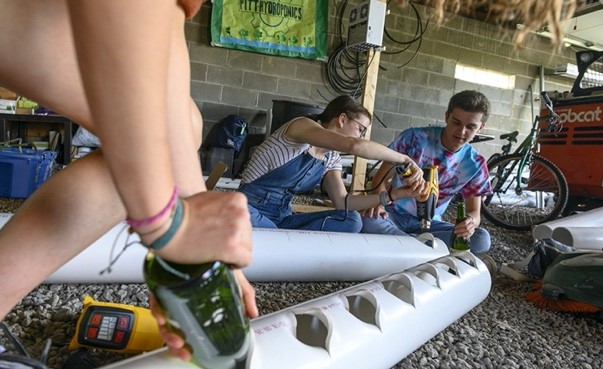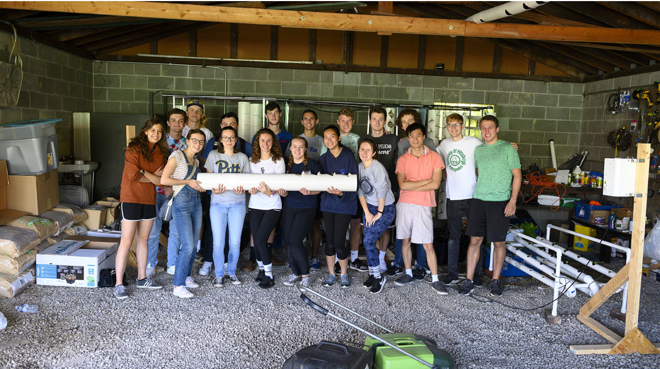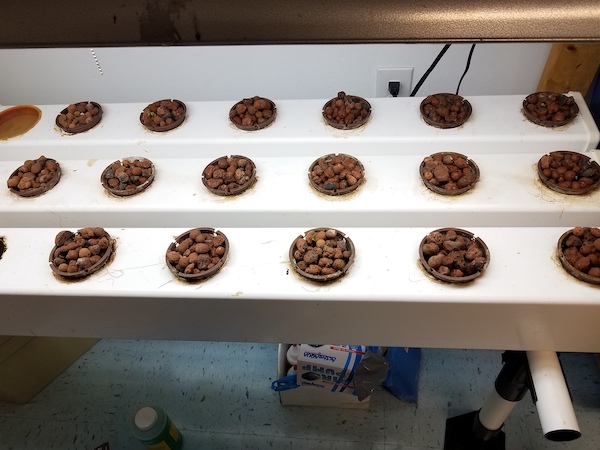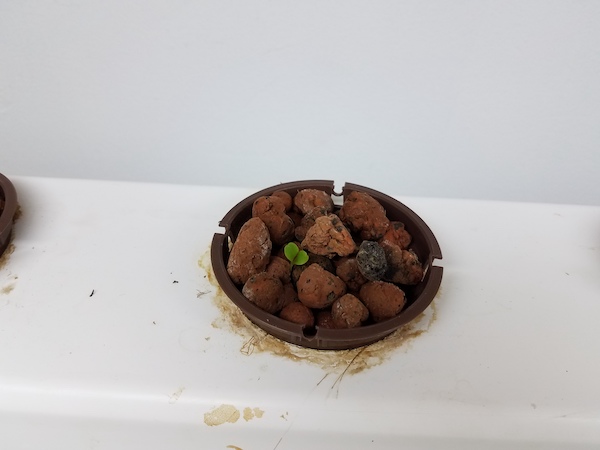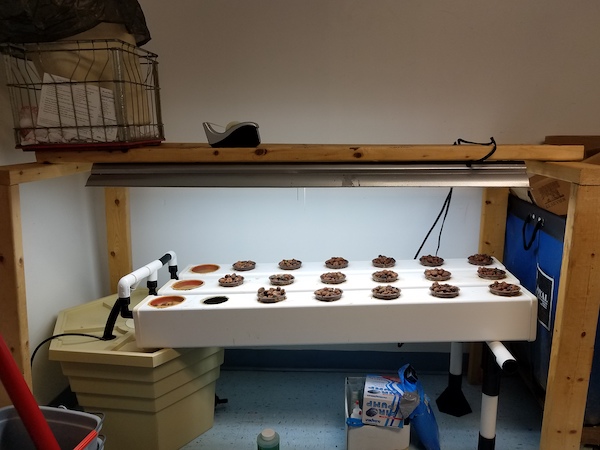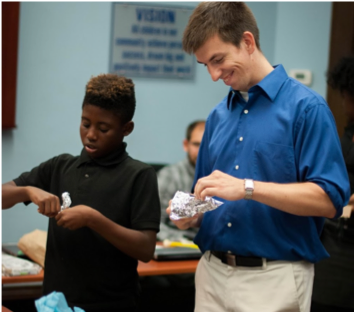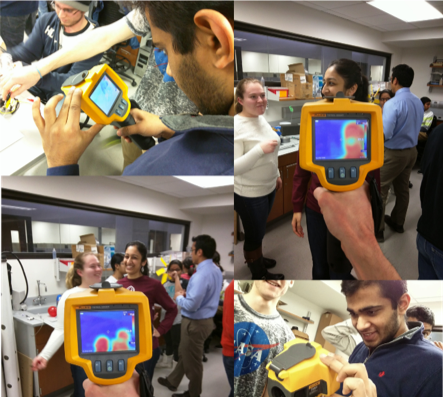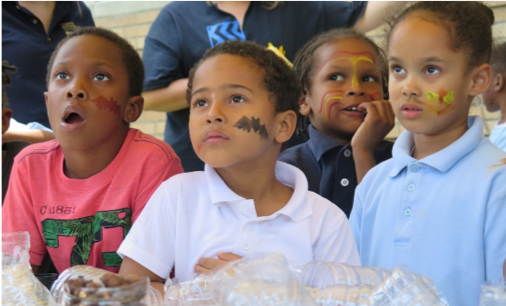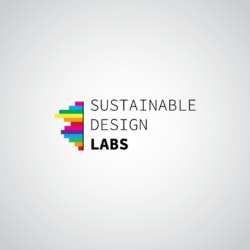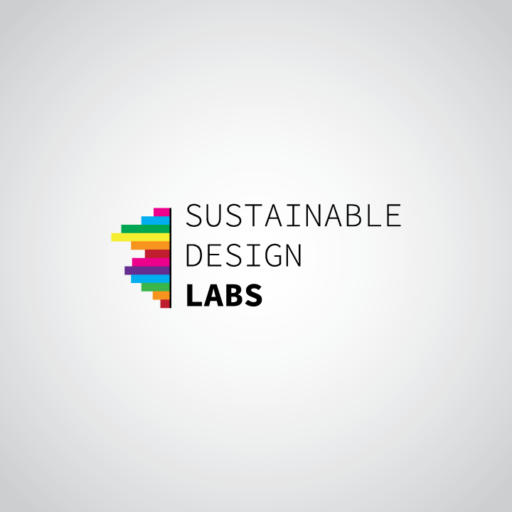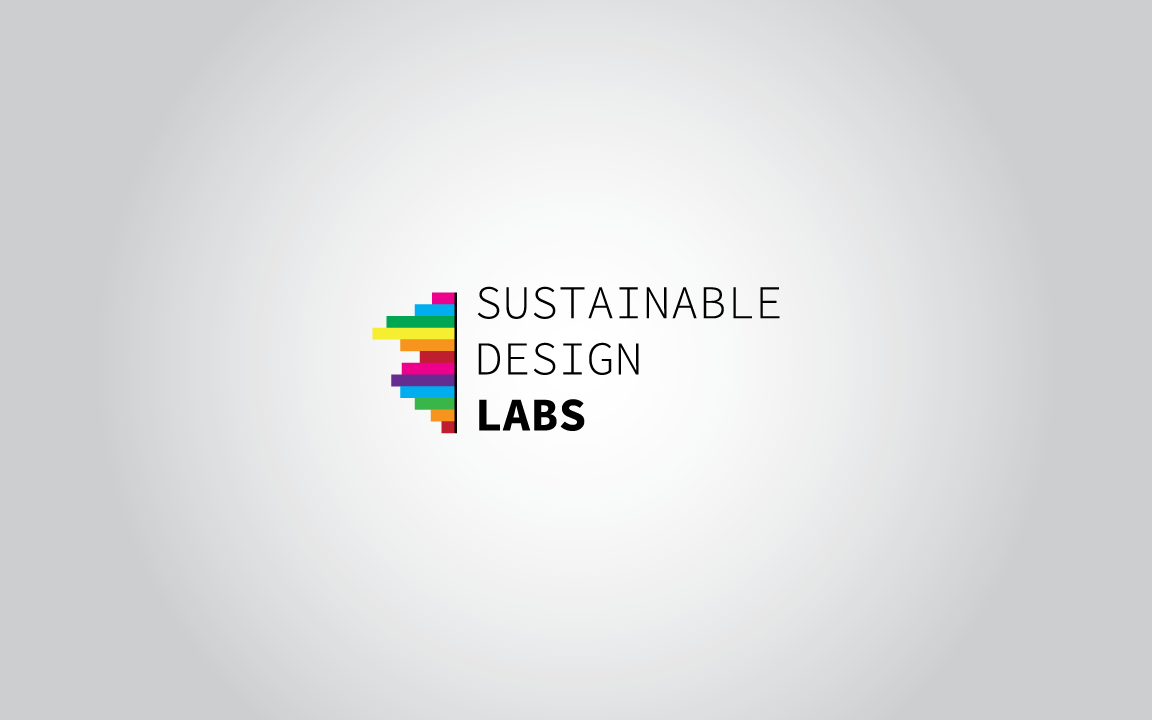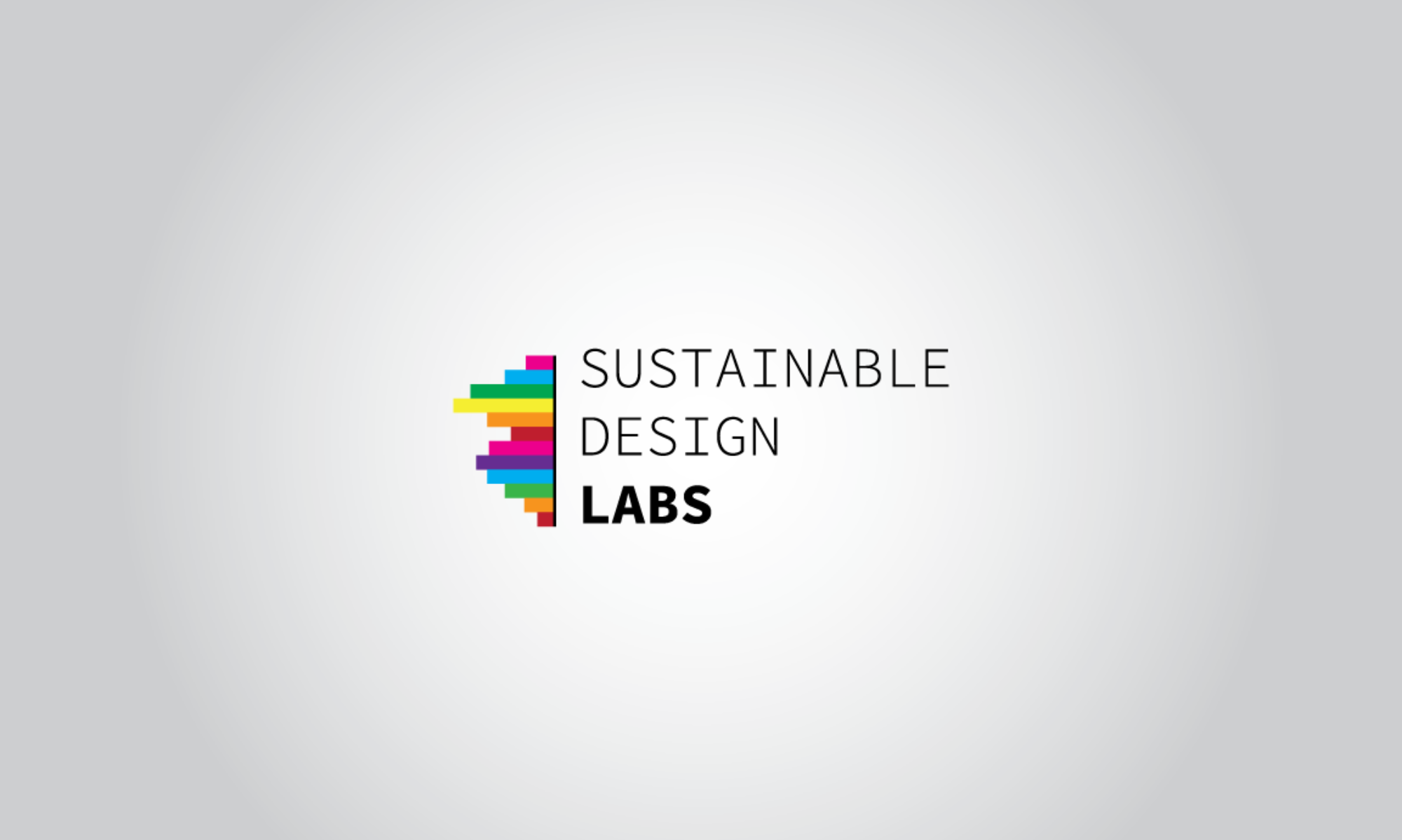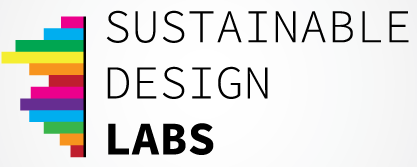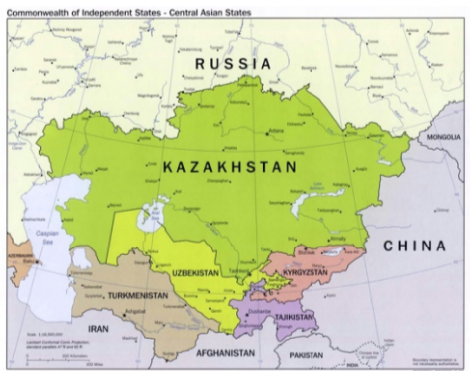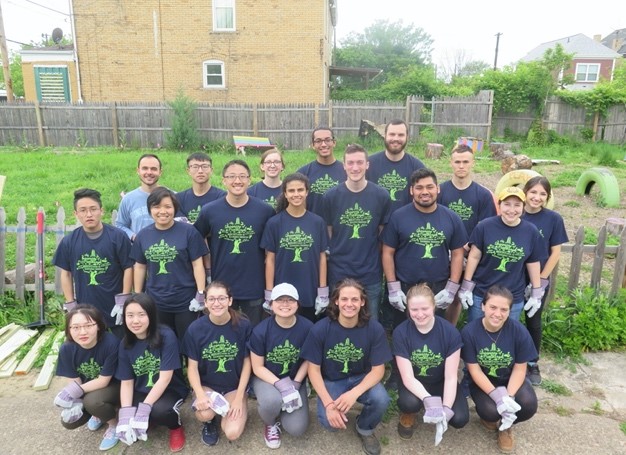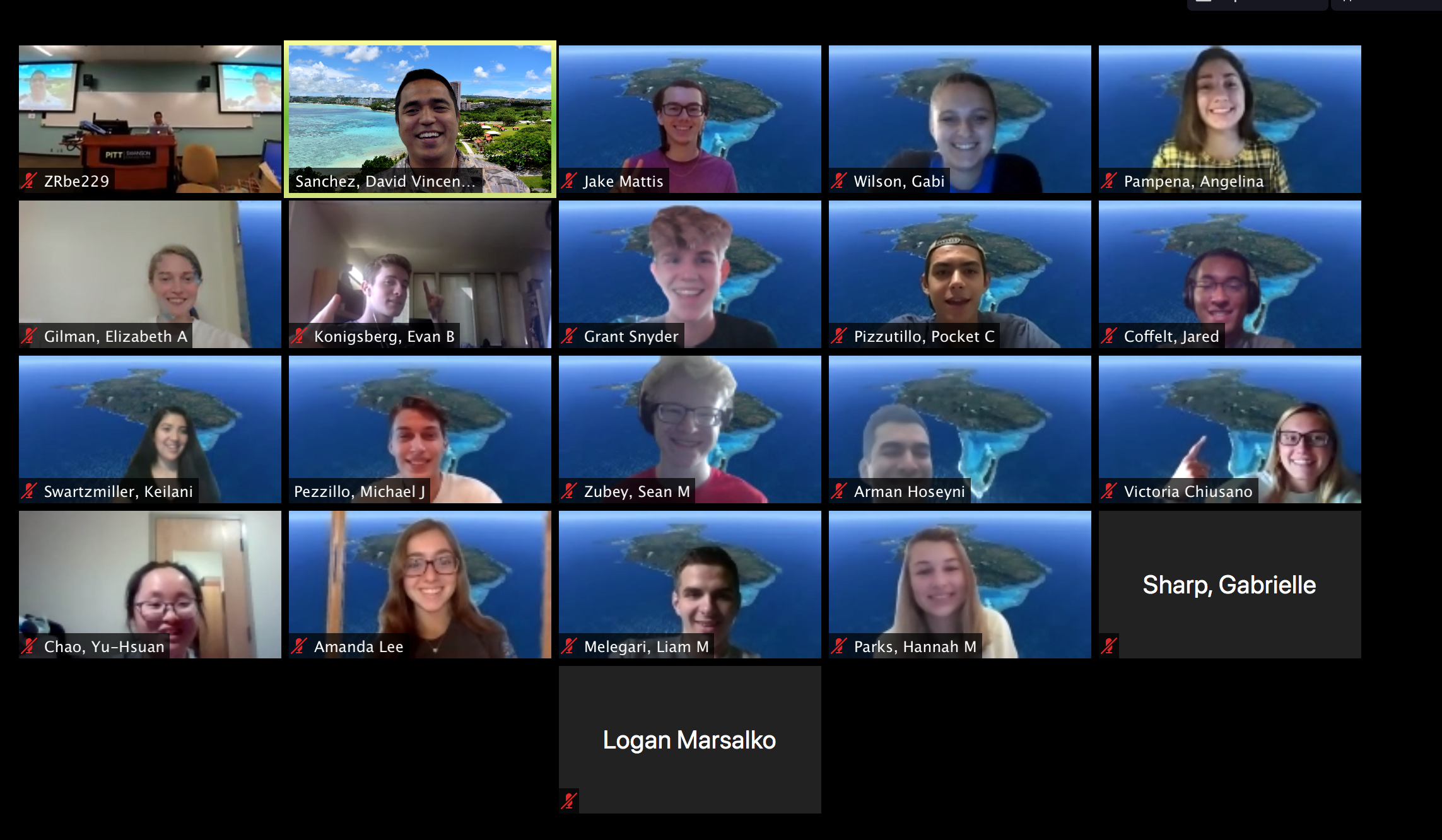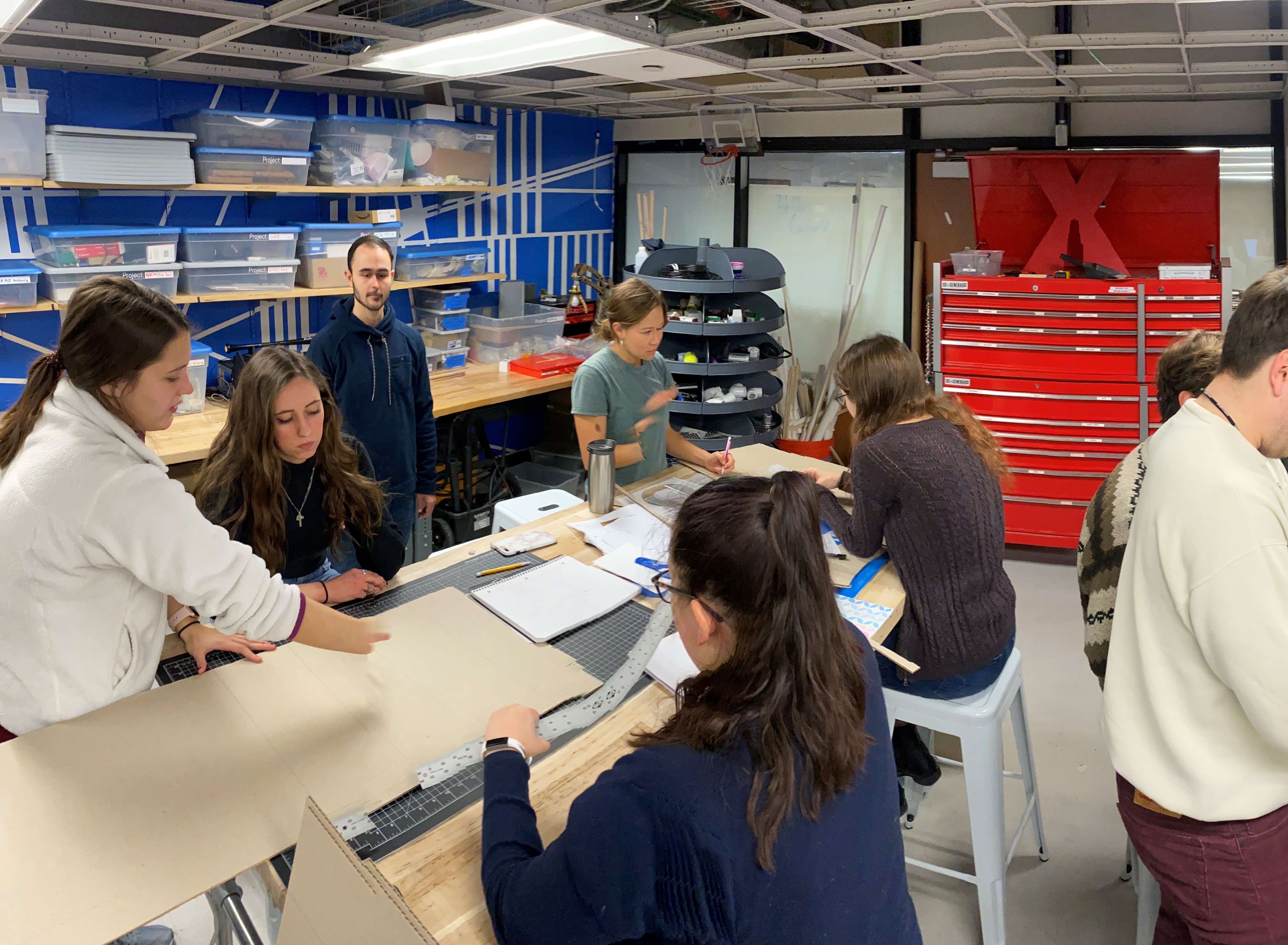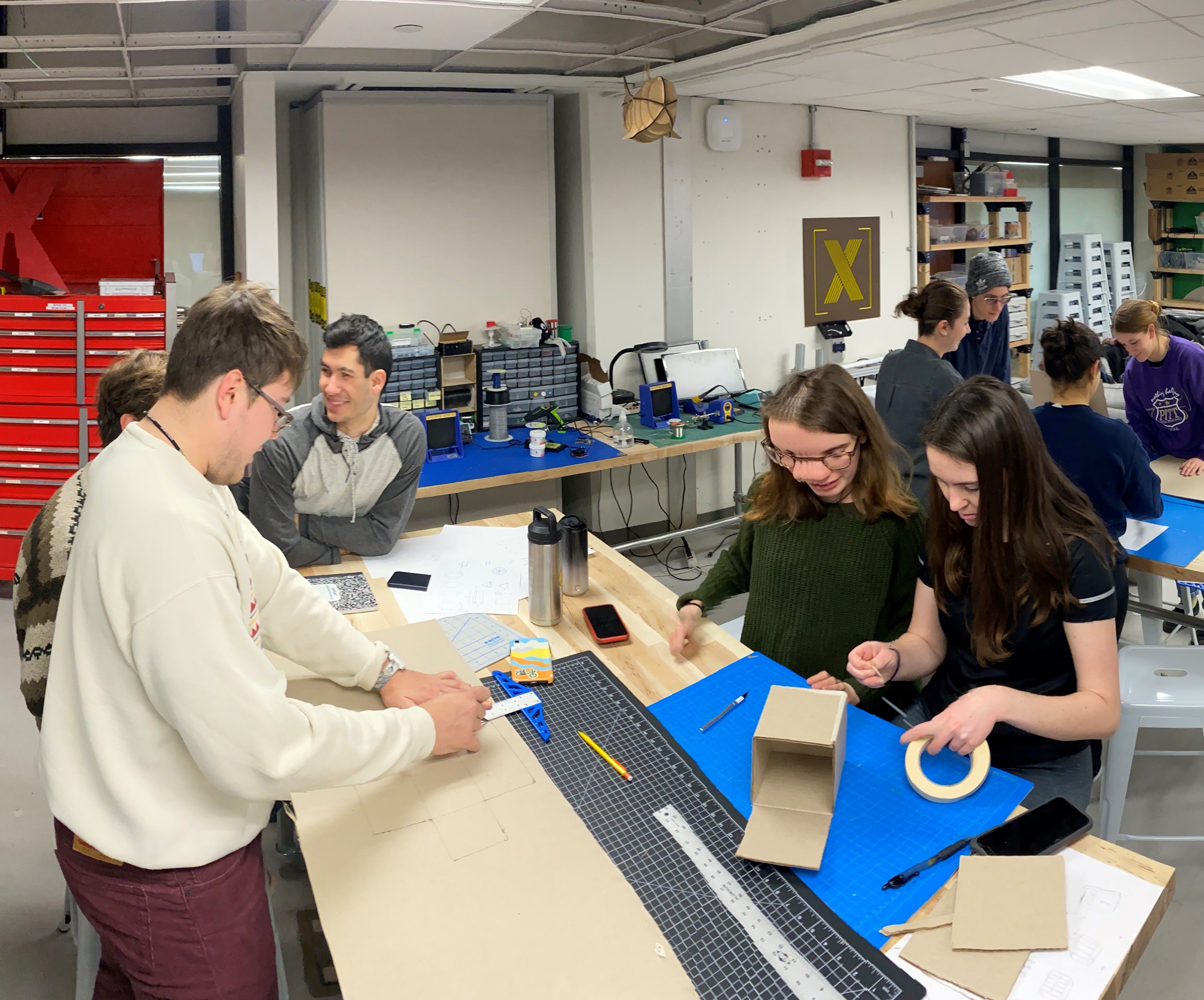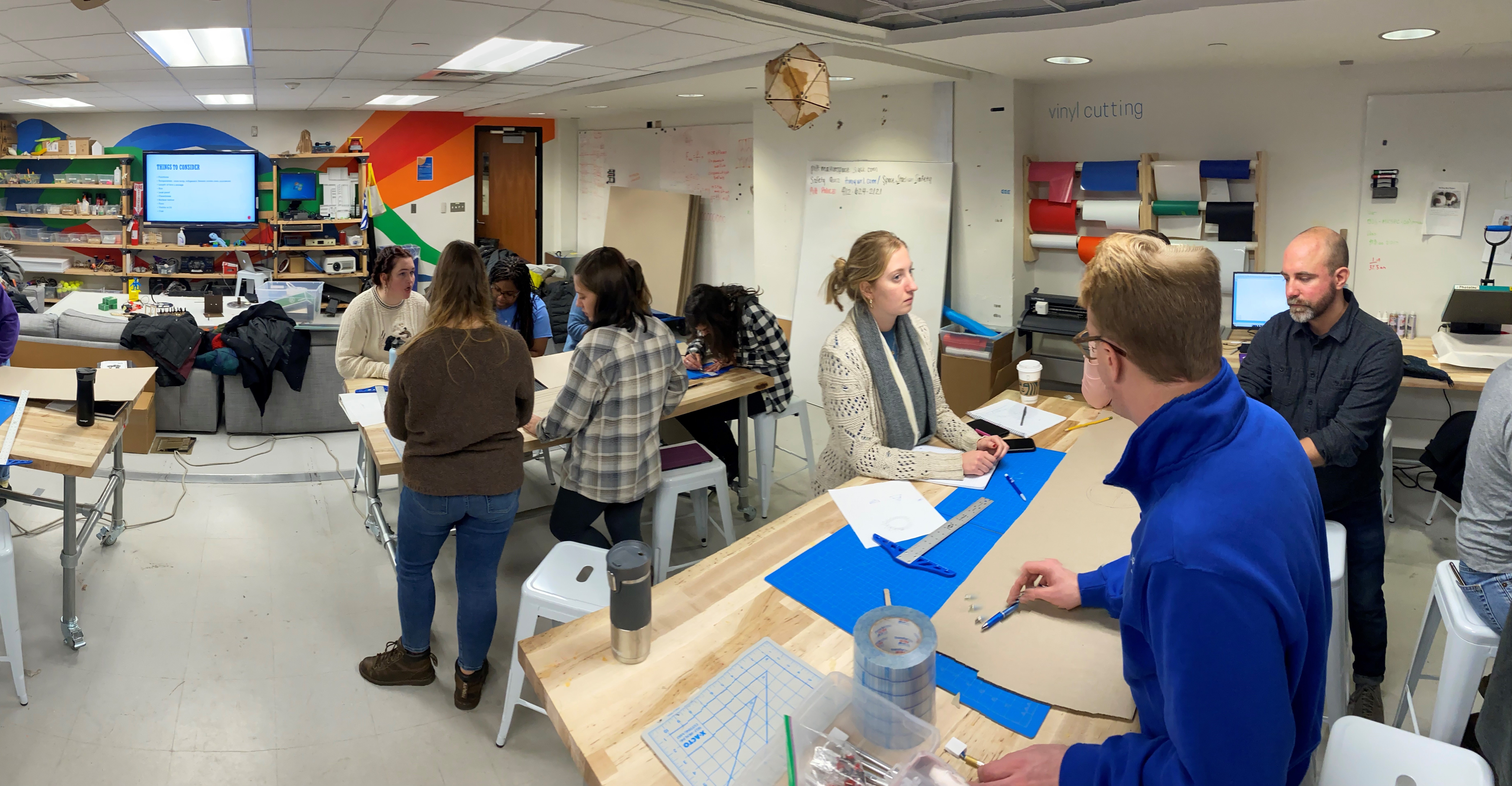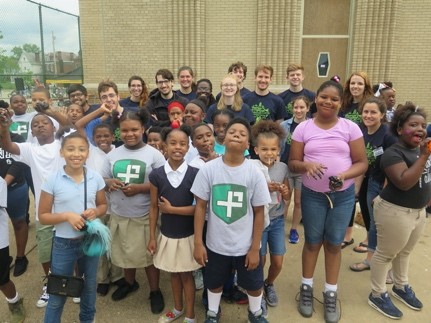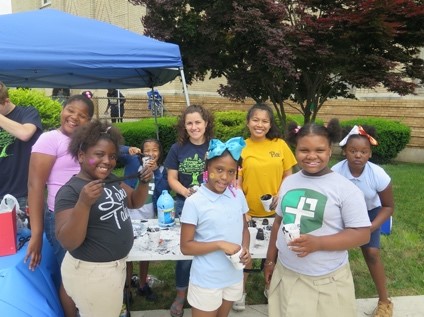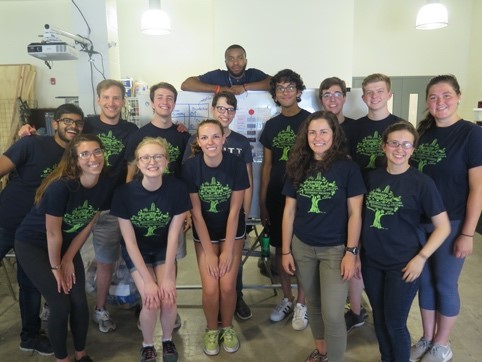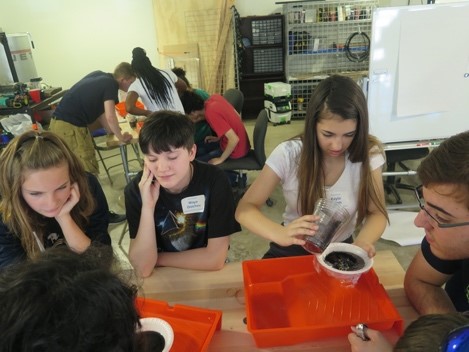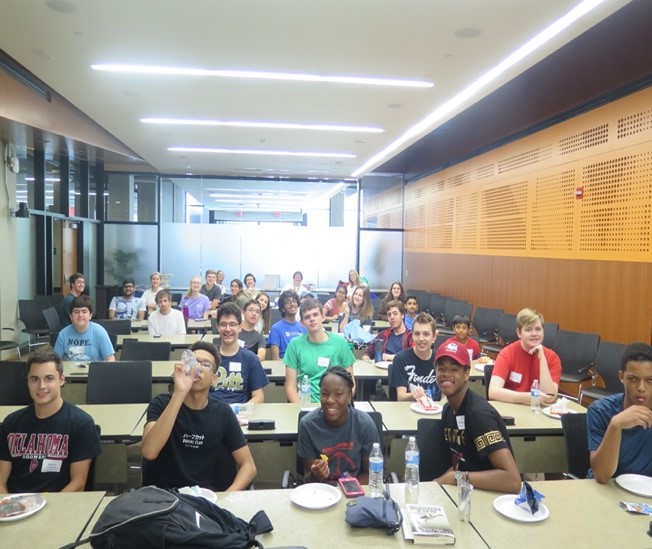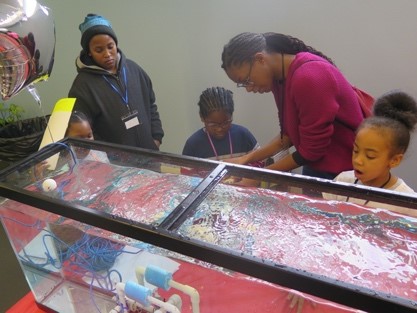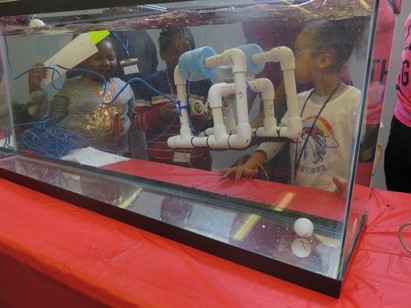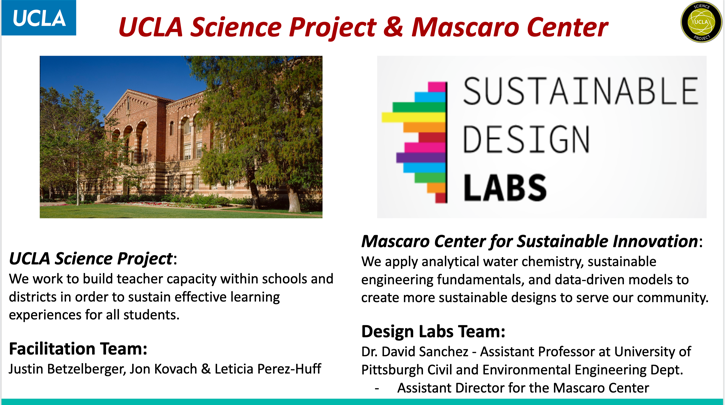Teach the Teacher – Building a Sustainable World Workshop
In its 6 year, this program is now a collaboration with UCLA’s CenterX for Teachers. I’ve built new sustainability and engineering modules around the Next Generation Science Standards that showcases SSOE faculty expertise and makerspaces
Recruitment focuses primarily on Western PA middle school teachers to help them integrate engineering and sustainability modules for their classrooms. The program indirectly engages about 2000 students in the SW PA region. After surveying the teachers, over half of them serve students on free-reduced lunch. 93% of teachers shared that they would be incorporating these engineering modules into their classrooms with 100% of them recommending this workshop to their peers and colleagues. Below are a couple of comments from teachers.
“I liked the combination of lecture, activities and time to collaborate with other teachers. The workshop flowed very well and gave us enough time to complete the work and ask questions.”
“It was very important to me that the modules were able to be done with little to no expense. Our school does not have a lot of lab supplies or resources, so modules based on items that we can find every day are VERY (MOST) important to me!”
“My education and understanding of sustainability was very different and from a totally different perspective. In taking this class, I really enjoyed looking at sustainability from a different stance. I think that this enables me to really look at my classroom and what I teach through a different lens. In doing this, growth can only naturally occur. Thank you.”
“David is phenomenal!! He has a great ability to bring information and learning strategies to teachers. I truly appreciate working with him and and thankful that I had the opportunity to participate in this program. I attended his professional development previously and actually used the module on water filtration with my students….. David is well suited as a facilitator. He is intelligent (extremely), but is able to talk with us (teachers) in a non-condescending respectful way. His jovial, witty sense of humor is so great! I had so much fun! Finally, I really appreciate all of the materials and props. They are so useful and important! Thank you, Thank you, Thank you!!!”
“He. Is. Fantastic. David really made this engaging, fun and valuable. It was nice to be heard, validated and learn at the same time. He really has a great way of working with adults and, while often speaking “down” so that we would understand, maintaining a level of respect that acknowledged that we are formal science teachers.”
Makerspace and Mindsets Bootcamp
Dr. Sanchez created (in collaboration with Brandon Barber) The Makerspace and Mindsets Bootcamp program which is designed for rising sophomores in the Swanson School of Engineering. “Our goal for the boot camp is to cultivate this approach to design and making that inspires all our students to incorporate it into their experience here at the Swanson School.”
https://www.engineering.pitt.edu/News/2019/Makerspace-Bootcamp-2019/
https://www.youtube.com/watch?v=7hhjw6Ktk-E&feature=youtu.be
Pitt Design EXPO
I served as the inaugural Faculty Director for the Design EXPO helping organize the event, judges, prizes and student projects. I continue to serve as the only Faculty member on the core team to assist the Academic Dean in hosting this event every semester. The event typically serves 400 students, 100 projects, and 100+ industry judges not to mention alumni.
https://www.flickr.com/photos/129807342@N05/albums/72157673941608093/page1
https://www.flickr.com/photos/129807342@N05/albums/72157698710490810
Constellation Energy Inventor Labs
Dr. Sanchez serves as the Director of the Energy Inventor Labs funded by Constellation Energy. The Energy Inventor Labs is a project designed to engage students using design-build challenges. We have created long-term partnerships to engage their middle school science students year after year. These students come primarily from underserved communities in Pittsburgh. To the left are pictures of some of the science students building their own solar house.
The Series – Fundamental skills for Inventors
Community Engagement
Oasis Project
In partnership with the Oasis project, Ivan Menz who is CEE student working with Dr. Sanchez has helped to facilitate the creation of a new system to grow Tilapia in their Bioshelter as a demonstration of Sustainable Food in a food desert. A Sustainability Capstone group helped Ivan this spring implementing the project. Here a few pictures below of the Capstone group and the inside the bioshelter.
Pitt Hydroponics & Community Health Services
Pitt Hydroponics aims to educate Pitt students and community members about hydroponics, provide fresh, sustainably grown produce to food deserts in the surrounding area, and further university research in hydroponic systems. The club regularly offers hands-on “build a mini system” nights to teach students and community members how to grow their own lettuce or basil without soil — even on a dorm room windowsill. Members are exploring the potential for installing systems in prominent spots on campus to raise awareness and produce. In addition to their Homewood location, club members maintain a hydroponic system at Community Human Services in Pittsburgh’s South Oakland neighborhood. It provides fresh lettuce for the CHS food pantry, which serves more than 800 families. My students also are partnering with The Community Day School in Squirrel Hill, which serves PreK through 8th grade students. Club members teach the students about hydroponics and have helped 6th through 8th grade students design and build a system that can be moved among their classrooms. The Pitt volunteers helped brainstorm and fine-tune Community Day students’ own designs. Concomitantly, they have brought hydroponics demos and kits to STEAM days programs at Lincoln Elementary School, which serves the city’s Homewood and Larimer neighborhoods.
November 27, 2019: Hydroponics Club Grows Food for Those in Need, Teaches Methods to Local Kids, Published in Pittwire.
The Pitt Hydroponics club was recently highlighted in Sustainable America; read the full profile.
Green Week
Manchester Academic Charter School
Sustainability & Engineering Programs
University of Pittsburgh- Master’s in Sustainable Engineering
PROGRAM OBJECTIVES
- Create regional and nationally scalable sustainability solutions through service learning projects with a cohort of students.
- Provide students with experiences that enable them to communicate sustainability issues and solutions to multiple audiences.
DEPTH OF LEARNING
- Provide advanced education to graduate students to identify and solve sustainability issues using systems approaches in the context of the triple bottom line of environmental, societal, and economic problems.
- Create a rigorous program with breadth and depth to propel graduate students to foster sustainable technologies, science, and practices in the U.S. and abroad
https://www.engineering.pitt.edu/MSSE/
University of Pittsburgh – Sustainability Certificate
University of Pittsburgh – Undergraduate Sustainability Research Program
Study Abroad – Sustainability of Island Nations – Jamaica
Sustainability & Engineering Education
Environmental Engineering Lab (CEE-1523)
Created the foundational lab for Environmental Engineering majors. It is a junior/senior level course that introduces the chemical, biological and physical protocols for environmental assessment and operation of environmental quality control. I designed the course to allow as much student ownership as possible. A different student team is responsible for leading each lab. I meet with the student leaders 2-3 times outside of class to go over the lab, their roles and responsibilities. Finally, I designed modules and bought sensors that enable students to measure environmental parameters in their homes, classrooms, and the larger environment around Pittsburgh.
Interdisciplinary teaching in core Sustainability Course (ENGR-1905)
Co-created this course with Dr. Mike Blackhurst to introduce interdisciplinary topics in Sustainability. It is one of the few courses that is taught across schools. This course has representation from multiple schools and often from more than 20 departments across campus.
Sustainability (Interdisciplinary) Capstone (ENGR-1907)
Created a course that focuses on interdisciplinary (SSOE, DSAS, SHRS, CBA etc.) teams, working on open-ended Sustainability challenges with external stakeholders. The course has hosted clients from Fortune 500 companies, International leaders, to local government and NGOs.
Engineering Sustainability in Island Nations (ENGR-1925/1605)
Incorporate grand challenges and culture from Island Nations to improve critical thinking, interdisciplinary design, engineering judgement, and leadership skills in engineering students. The concepts have been developed for both Jamaica and Guam.
Water in Central Eurasia course sponsored by National Endowment for Humanities
I designed a course in collaboration with Prof. John Camillus, “Central Eurasian Water Future” and drawing 19 undergraduate students, focused on Kazakhstan and incorporated analytic approaches from the Business of Humanity® Project (http://boh.pitt.edu). The course’s emphasis on Kazakhstan allowed students to explore contemporary issues relating to water in Central Eurasia. With guest lectures by Dr. Shanazarova (Religious Studies/History), Dr. Elissa Bullion (Anthropology), Dr. Vasili Rukhadze (Political Science), and myself (Thursday, 4th March) introduced students to the historical, cultural, and political complexity of Central Eurasia, the course advocated for emphasizing Kazakhstan on the grounds that this country not only provides a lens on challenges to water sustainability in the region but also has the largest economy in Central Eurasia.
Undergraduate Research
Since starting my role at Pitt in 2015, I have provided 40 undergraduate students the opportunity to work on research projects. All funds to support these projects were external to CEE (i.e. Constellation Energy Labs, CRF, MCSI etc.) and paid for project materials and sometimes a stipend as some students preferred academic credit or experience. Below are the list of students and dates they were a part of my lab. Superscripts indicate where support for their project primarily came from (*Constellation, #MCSI, %Excel, ^NSF/NB project.
MCSI Summer Undergraduate URP
For the past 6 years I have served as the lead faculty for the Summer Undergraduate Research Program. This includes reviewing, planning, mentoring, and leading the program which has impacted hundreds of engineers since its inception.
Global Engagement Series for Guam (Virtual)
As part of a Global Engagement Series created with the study abroad office I created a virtual series on Sustainability of Island Nations. It was held in the Fall and a screenshot from the event can be found here.
Innovation and Entrepreneuriship Bootcamp for Non-Engineers
We were awarded a Provost Year of Creativity Grant ($5k) to conduct Creativity Bootcamps for both Engineers and Non-Engineers. We held our workshops at the beginning of Spring 2020 hosting over 30 students.
Engineering Happiness Workshops
In response to the increase in anxiety of students and engineering students I created a seminar called Engineering Happiness and prototyped the seminar over 4 sessions in the Spring. The seminar was attended by over 30 students and was well received based on their surveyed responses. With the guidance of the Associate Dean and Dean we will determine how this initiative may best help the Swanson School of Engineering. Given the increasing anxiety and isolation created by the COVID-19 transitions I hosted three separate engineering happiness workshops for staff, faculty and students.
Lincoln Elementary STEAM Days
Each year in June, I bring undergraduate summer research students to engage in a project called STEAM Days. For a full school day our engineering students engage ~200 elementary students in fun, hands-on, science demos. These include water propulsion, chemical reactions, magnetic fluids, clay electronic circuits and much more.
Clean Water Academy
Created the Clean Water Academy with ALCOSAN. We had undergraduate research students work side by side with 30 students from around the region to facilitate the design and fabrication of a miniaturized wastewater treatment plant in a 2 day sprint. On the third day the students were welcomed to Pitt SSOE where our ambassadors and admission staff gave them a tour and intro to Pitt Engineering.
Dream Steam
In the community of Homewood, the Bible Center Church sponsors a program called DREAM STEAM. In honor of Dr. Martin Luther King Jr., we bring our underwater robots to the event to help students learn more about the fun process of becoming an engineer. The students are tasked with picking up a ping pong ball or golf ball using our underwater.
Virtual Lab with All-Girls STEM Academy (GALA) in Los Angeles
Seniors from the Girls Academic Leadership Academy in LA visited our lab in Pittsburgh. We hosted them virtually for tours and interviews about the work we do. A better description of the work is found here:
https://news.engineering.pitt.edu/first-hand-stem-experiences-from-coast-to-coast/

